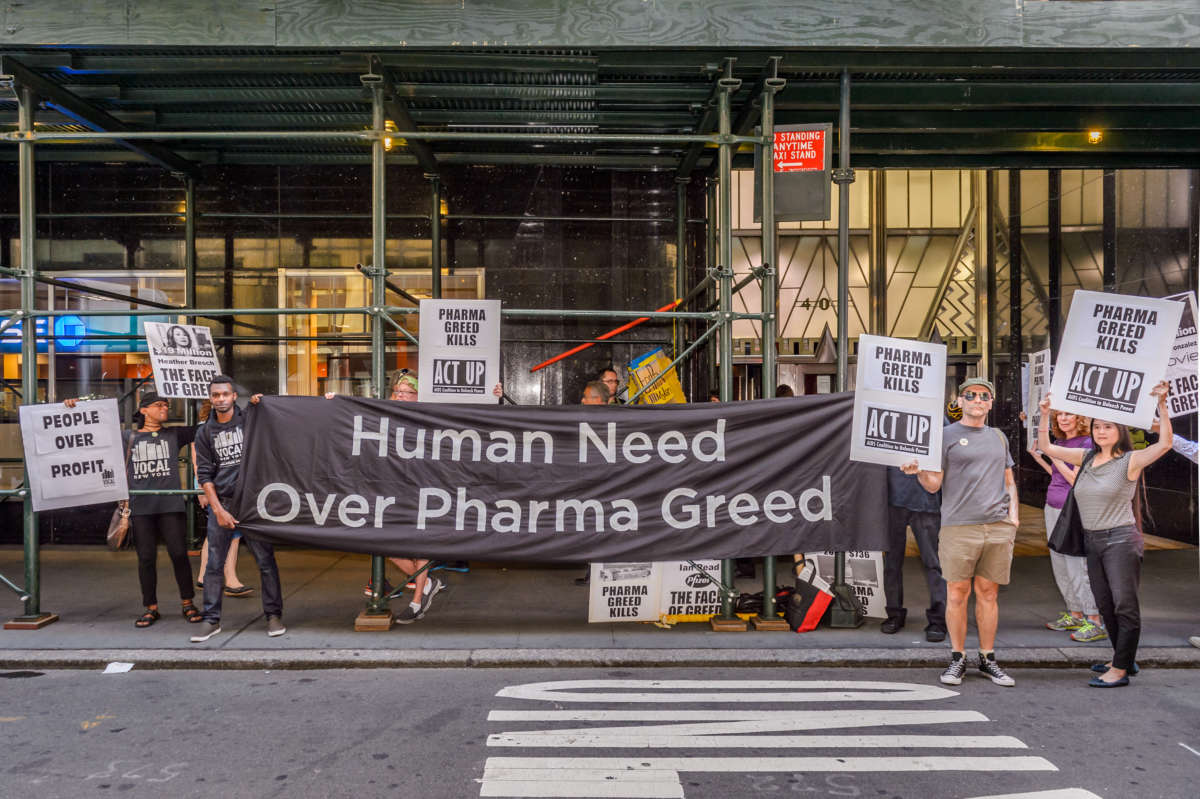As a result of the coronavirus pandemic, hospitalizations skyrocketed in 2020, but routine visits to the doctor’s office and demand for new prescription medications fell sharply during the worldwide lockdown.
To make up for lost revenue, the pharmaceutical industry plans to ring in the New Year by raising prices on more than 300 drugs in the United States on January 1, according to an analysis by healthcare consulting firm 3 Axis Advisors, whose findings were summarized in an exclusive report published Thursday in Reuters.
As Reuters pointed out, “The increases come as pharmaceutical companies like Pfizer are playing hero by developing vaccines for Covid-19 in record time.”
While scientific advances made by pharmaceutical companies have contributed to defeating the pandemic, critics argue that it would be naive to assume the industry is simply motivated to improve people’s well-being.
“Big Pharma’s greed is a danger to public health,” Reps. Pramila Jayapal (D-Wash.) and Mark Pocan (D-Wis.) said earlier this year, when Gilead announced that it would charge U.S. hospitals $3,120 per privately insured patient for a treatment course of remdesivir, a Covid-19 drug whose development was financed in large part by taxpayers.
Pfizer spokesperson Amy Rose pointed to the coronavirus vaccine the company developed with Germany’s BioNTech in an attempt to justify next year’s drug price hikes. “This modest increase,” Rose said in a statement, “is necessary to support investments that allow us to continue to discover new medicines and deliver those breakthroughs to the patients who need them.”
Nevertheless, as David Mitchell, a cancer patient and founder of Patients for Affordable Drugs Now, said last month, “Drugs don’t work if people can’t afford them.”
To “get innovation we need at prices we can afford,” Mitchell added, “restore balance… [and] end unlimited drug corporation pricing power.”
Drug manufacturers, including Pfizer, Sanofi USA, and GlaxoSmithKline, “are also fighting new drug price cutting rules from the Trump administration, which would reduce the industry’s profitability,” Reuters reported.
President Donald Trump pledged in 2016 to reduce prescription drug prices in the U.S., which are among the highest in the world, but it wasn’t until late 2020 that he issued a handful of executive orders meant to slash prices. According to Reuters, “Their impact could be limited by legal challenges and other problems.”
The news outlet continued:
A federal judge earlier this month blocked a last-minute Trump administration rule aimed at lowering drug prices that was set to be implemented at the beginning of the year. It was challenged by drug industry groups including PhRMA, the nation’s leading pharmaceutical trade group.
President-elect [Joe] Biden has also vowed to reduce drug costs and to allow Medicare, a U.S. government health insurance program, to negotiate drug prices. He has support from congressional Democrats to pass such legislation, which the Congressional Budget Office has said could cost the industry more than $300 billion by 2029.
As Common Dreams reported last month, researchers have linked the failure to address the unaffordable costs of prescription medications to a rise in “cost-related nonadherence” to drug therapy, which increases preventable suffering, premature deaths, and healthcare spending.
We’re not backing down in the face of Trump’s threats.
As Donald Trump is inaugurated a second time, independent media organizations are faced with urgent mandates: Tell the truth more loudly than ever before. Do that work even as our standard modes of distribution (such as social media platforms) are being manipulated and curtailed by forces of fascist repression and ruthless capitalism. Do that work even as journalism and journalists face targeted attacks, including from the government itself. And do that work in community, never forgetting that we’re not shouting into a faceless void – we’re reaching out to real people amid a life-threatening political climate.
Our task is formidable, and it requires us to ground ourselves in our principles, remind ourselves of our utility, dig in and commit.
As a dizzying number of corporate news organizations – either through need or greed – rush to implement new ways to further monetize their content, and others acquiesce to Trump’s wishes, now is a time for movement media-makers to double down on community-first models.
At Truthout, we are reaffirming our commitments on this front: We won’t run ads or have a paywall because we believe that everyone should have access to information, and that access should exist without barriers and free of distractions from craven corporate interests. We recognize the implications for democracy when information-seekers click a link only to find the article trapped behind a paywall or buried on a page with dozens of invasive ads. The laws of capitalism dictate an unending increase in monetization, and much of the media simply follows those laws. Truthout and many of our peers are dedicating ourselves to following other paths – a commitment which feels vital in a moment when corporations are evermore overtly embedded in government.
Over 80 percent of Truthout‘s funding comes from small individual donations from our community of readers, and the remaining 20 percent comes from a handful of social justice-oriented foundations. Over a third of our total budget is supported by recurring monthly donors, many of whom give because they want to help us keep Truthout barrier-free for everyone.
You can help by giving today. Whether you can make a small monthly donation or a larger gift, Truthout only works with your support.
